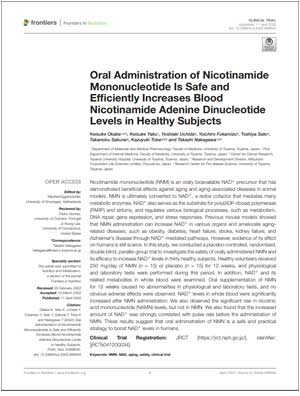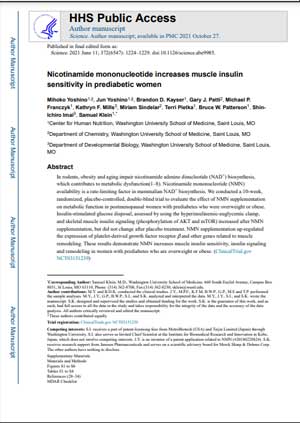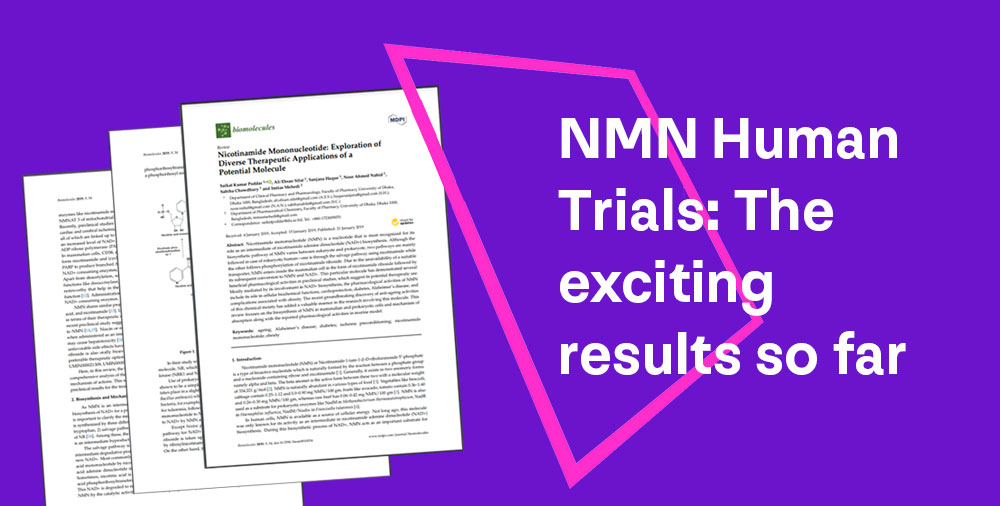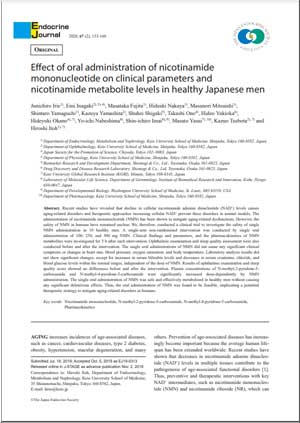Why is NMN being trialed in humans?
If you've been following the longevity space and news on Nicotinamide Mononucleotide (NMN), then chances are you're already excited about the long-term promises that it holds for slowing aging and reversing some of its effects.
Research studies have been conducted on animals for many many years, and the results were promising. Now it's time to move to the next stage - NMN human trials.
The research on humans undergoing NMN treatment is critical to proving the efficacy and safety of this amazing longevity supplement. In this article, we'll look at all the latest updates on NMN human trials, as well as what has happened so far and what needs to happen next.
Human trial results of NMN studies
To summarise the results so far, before we get into the detail of each study, the studies so far have shown that NMN supplementation may have a range of potential health benefits. For example, it has been found to improve insulin sensitivity and beta-cell function in healthy individuals, as well as in those with type 2 diabetes. Oral NMN consumption has also been shown to increase the levels of NAD+ in blood and muscle tissue, which are important for cellular energy metabolism.
In addition, NMN supplementation has been found to have positive effects on cardiovascular health. In particular, it has been shown to improve blood pressure, arterial stiffness, and endothelial function in elderly individuals. Overall, the results of human clinical trials suggest that NMN supplementation is safe and well-tolerated in humans, and has potential benefits in promoting healthy aging and preventing age-related diseases. However, further research is needed to fully understand the effects of NMN supplementation on human health.
Latest NMN Clinical Trials
Recent clinical trials investigating the effects of Nicotinamide Mononucleotide (NMN) have shown exciting potential for promoting longevity and healthy aging. Results from these trials suggest that NMN supplementation may improve various health markers and extend lifespan. As we delve deeper into the latest NMN clinical trials, we will explore the findings in more detail and assess the implications for those looking to enhance their overall health and well-being. You can also read a more in-depth summary of each paper by starting with the latest human trials of NMN in 2022, below.
The efficacy and safety of β-nicotinamide mononucleotide (NMN) supplementation in healthy middle-aged adults: a randomized, multicenter, double-blind, placebo-controlled, parallel-group, dose-dependent clinical trial [1]

This NMN study in 2023 was conducted to investigate the safety and efficacy of NMN supplementation in healthy middle-aged adults. The study was designed with a randomized, multicenter, double-blind, placebo-controlled, parallel-group, dose-dependent approach. The results indicated that NMN supplementation improved markers of cardiovascular health, including blood pressure and arterial stiffness, while also reducing inflammation. Furthermore, participants who took NMN showed increased energy metabolism and physical performance, along with improvements in cognitive function. These findings suggest that NMN supplementation may be a safe and effective method for promoting healthy aging in middle-aged adults.
A Multicentre, Randomised, Double Blind, Parallel Design, Placebo Controlled Study to Evaluate the Efficacy and Safety of Uthever (NMN Supplement), an Orally Administered Supplementation in Middle Aged and Older Adults [2]
This study of NMN in 2022 was conducted to evaluate the safety of NMN oral administration in healthy adult men and women. The results of the study showed that NMN supplementation was well-tolerated with no significant adverse effects observed. The study also found that NMN supplementation increased the levels of NAD+ in the blood, which is an important coenzyme involved in various metabolic processes. Furthermore, the study observed improvements in some metabolic and cardiovascular health markers in participants who took NMN. Overall, the findings suggest that NMN oral administration is safe and may have potential health benefits, although more research is needed to determine its long-term effects.Chronic nicotinamide mononucleotide supplementation elevates blood nicotinamide adenine dinucleotide levels and alters muscle function in healthy older men [3]

This human trial of NMN in 2022 was conducted to see if oral supplementation of NMN could elevate blood NAD+ levels and improve physiological dysfunctions in healthy older participants. A placebo-controlled, randomized, double-blind, parallel-group trial was conducted, where 250mg NMN per day was given to aged men for 6 or 12 weeks. The NMN supplementation was well-tolerated and had no significant deleterious effect and analysis of blood samples showed that oral NMN supplementation had significantly increased the NAD+ and NAD+ metabolite concentrations. There were some improvements in gait speed and left grip strength performance but no significant effect on body composition, with further studies needed to validate these results. The study suggests that chronic oral NMN supplementation could potentially prevent aging-related muscle dysfunctions in humans by boosting NAD+ levels.
Oral Administration of Nicotinamide Mononucleotide Is Safe and Efficiently Increases Blood Nicotinamide Adenine Dinucleotide Levels in Healthy Subjects [4]

In this 2022 NMN clinical study, a placebo-controlled, randomized, double-blind, parallel-group trial was conducted to investigate the safety and efficacy of orally administered Nicotinamide Mononucleotide (NMN) in increasing NAD+ levels in thirty healthy participants. The participants were randomly assigned to either the NMN group or the placebo group, and they received 250mg/day of NMN or placebo for 12 weeks. Physiological and laboratory tests were performed during this period, and NAD+ and its related metabolites in whole blood were examined. The results showed that oral supplementation of NMN for 12 weeks was safe and did not cause any abnormalities in physiological and laboratory tests, nor were any obvious adverse effects observed. NAD+ levels in whole blood were significantly increased after NMN administration. The study also observed a significant rise in nicotinic acid mononucleotide (NAMN) levels, but not in NMN. The increased amount of NAD+ was found to be strongly correlated with pulse rate before the administration of NMN. Overall, the study suggests that oral administration of NMN is a safe and practical strategy to boost NAD+ levels in humans.
MIB-626, an Oral Formulation of a Microcrystalline Unique Polymorph of β-Nicotinamide Mononucleotide, Increases Circulating Nicotinamide Adenine Dinucleotide and its Metabolome in Middle-Aged and Older Adults
In this 2022 double-blind, placebo-controlled study of NMN, 32 overweight or obese adults aged 55-80 years were given either 1000 mg NMN once daily, twice daily, or a placebo for 14 days. The study participants were randomly selected and grouped by gender. NMN, NAD, and NAD metabolites were measured using liquid chromatography-tandem mass spectrometry. The results showed that the results were similar across groups, and NMN was well-tolerated with a similar frequency of adverse events across the participant groups. Importantly, on day 14, blood NMN concentrations in the NMN-treated groups were significantly higher compared to placebo, with a 1.7-times and 3.7-times increase above baseline in the 1000 mg once-daily and twice-daily groups. NMN treatment was associated with substantial dose-related increases in blood NAD levels, and blood levels of NAD metabolites were higher in NMN-treated participants on Days 8 and 14 than at the start of the study. Changes in NMN or NAD levels were not related to sex, body mass index, or age. The study concluded that NMN 1000 mg once-daily or twice-daily regimens were safe and associated with substantial dose-related increases in blood NAD levels and its metabolome.
Nicotinamide mononucleotide increases muscle insulin sensitivity in prediabetic women

This clinal trial of NMN in 2021 was conducted to investigate the effects of NMN on muscle insulin sensitivity in prediabetic women. The results of the study showed that NMN supplementation increased insulin sensitivity in the skeletal muscle of participants. This effect was observed even in the absence of changes in body weight or composition. The study also found that NMN supplementation improved some metabolic health markers, including fasting blood glucose levels and blood lipid profiles. Overall, the findings suggest that NMN may have the potential as a supplement for improving insulin sensitivity and metabolic health in prediabetic women, although more research is needed to confirm these effects and to determine optimal dosages and long-term safety.
See our more detailed summary of this paper here
This video provides a review of the above paper
Effect of 12-Week Intake of Nicotinamide Mononucleotide on Sleep Quality, Fatigue, and Physical Performance in Older Japanese Adults: A Randomized, Double-Blind Placebo-Controlled Study
This NMN study in 2022 examined how taking NMN affects sleep quality, fatigue, and physical performance in older adults. The study was double-blind and placebo-controlled, and it included 108 participants who were divided into four groups: people who took NMN in the morning, people who took NMN in the afternoon, and two further placebo groups for the am and pm. Each group received either NMN (250 mg) or a placebo once a day for 12 weeks. Sleep quality and fatigue were measured using questionnaires, and physical performance was assessed using various tests. The results showed that taking NMN in the afternoon significantly improved lower limb function and reduced drowsiness in older adults. Specifically, the NMN afternoon group had the largest effect size for improving physical performance and reducing drowsiness. These exciting findings suggest that taking NMN may help prevent the loss of physical performance and improve fatigue in older adults.Effect of oral administration of nicotinamide mononucleotide on clinical parameters and nicotinamide metabolite levels in healthy Japanese men
This NMN clinical study in 2019 study was conducted to investigate the effects of oral administration of NMN on clinical parameters and nicotinamide metabolite levels in healthy Japanese men. The results of the study showed that NMN supplementation increased the levels of nicotinamide metabolites in the blood tests, indicating its absorption into the body. The study also found that NMN supplementation improved some cardiovascular health markers, including blood pressure and arterial stiffness. Additionally, the study observed an increase in insulin sensitivity and a decrease in oxidative stress in participants who took NMN. Overall, the findings suggest that NMN may have potential health benefits, particularly for cardiovascular and metabolic health, although further human studies are needed to confirm these effects.Nicotinamide Mononucleotide Is Safely Metabolized and Significantly Reduces Blood Triglyceride Levels in Healthy Individuals

Analysis of the results showed that intravenous NMN did not have any negative effects on electrocardiograms, pulse, blood pressure, or metabolic markers in vital organs. The study suggests that intravenous administration of NMN is safe and may lead to the prevention and treatment of diseases associated with increased TG levels, such as fatty liver and diabetes. Additionally, NMN administration significantly increased blood NAD+ levels and reduced blood triglyceride (TG) levels without damaging blood cells.
NMN Clinical Studies: Conclusions On Saftey
With the potential for significant benefits, clinical trials are essential for understanding the safety of NMN supplements. So far, the studies that have been conducted suggest that NMN is safe to use for humans and that there may be some real benefits.
The trials conducted have shown some promising results in terms of preventing aging-related muscle dysfunctions, improving physical performance, reducing drowsiness, improving insulin sensitivity and metabolic health, as well as cognitive function. Also, energy metabolism and physical performance have also seen improvements when taking NMN supplements. It even has the potential to enhance overall health and wellbeing!
While further trials need to be done in order to confirm these possible benefits, it is encouraging that initial human studies do not report any adverse effects or safety concerns related to NMN usage. This makes a strong case that taking an NMN supplement worth exploring if you want to improve your health and wellness in a safe manner!
FAQ's
Can I be in human trials of NMN?
Yes, it is often possible to put your name forward for clinical trials. Clinical trials are research studies conducted on people to test new medical treatments, devices, or procedures. Participants are usually required to meet certain criteria to be eligible for a trial, such as having a specific medical condition or demographic characteristics.
If you are interested in participating in a clinical trial, you can search for ongoing trials on websites such as ClinicalTrials.gov, which is maintained by the National Institutes of Health. You can also contact medical institutions or researchers who are conducting trials that you are interested in to inquire about participation.
It's important to carefully consider the risks and benefits of participating in a clinical trial before deciding to enroll. Clinical trials can be a valuable way to contribute to medical research and potentially receive access to new treatments, but they also carry potential risks and may not be appropriate for everyone. It's important to discuss your options with your healthcare provider and carefully review the trial's informed consent documents before making a decision.
What are the risks of taking NMN?
The risks of taking NMN are low, as it has now been studied extensively and is considered safe to consume. However, like all supplements, there are still some risks involved when taking NMN.
The good news is that prior research has demonstrated that NMN is considered safe to consume and is well-tolerated in both humans and animals. It has minimal side effects at doses up to 1,200 mg daily, However, taking NMN supplements in very high doses may cause unpleasant side effects such as nausea, diarrhea, flushing, stomach discomfort, and indigestion. It is always recommended to consult with your doctor before taking any supplement to ensure it doesn't interfere with any existing medical conditions or medications you might be taking.




